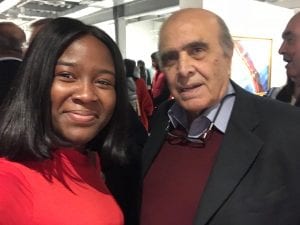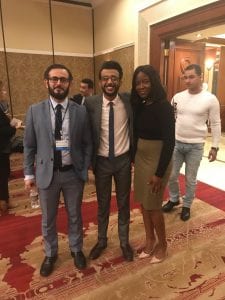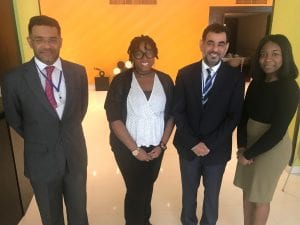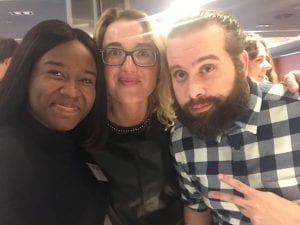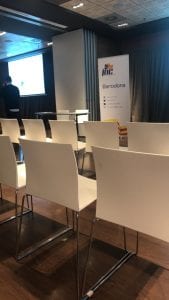By Joy Kayode
اهلاً وسهلاً،
مرحبا بكم في رسالتي الأخيرة!
Welcome to my last post, friends! Thank you to everyone that has followed my study abroad journey in Amman, Jordan throughout the past three months. There are no words to describe how much I have enjoyed my time in Amman!
I have already discussed the volunteer project I completed in the United Arab Emirates with the Al Ihsan Charity (see blog 3). On Tuesday, I will complete my final volunteer endeavor. We’ll be working at an all-boys school about 45 minutes away from my program site and the overall theme of the day will be grounds beautification. We’ll have two main teams: one for gardening and one for trash pickup. The gardening projects will include soil preparation (mixing manure into their soil), planting things, and trimming trees and overgrown bushes. We’ll also be picking up trash and hopefully installing some permanent trash cans in the courtyard area. This is a mandatory day of service for SIT students. I am happy that this is a mandatory project. I don’t think there could be a better way to leave a positive impact in the country that has so generously hosted us for three months. To be in service to others is to be in service to oneself. We will also have the opportunity to work closely with local residents of the Badia as some students from the school will also be helping us with the work. With this upcoming community service project, I do believe that I will be making an impact on the community that we will be assisting. Our program director let us know that at the school we are going going to, there are many things we consider basic that they have simply forgone. For instance, there are no trash cans at the school. It is my desire that by supplying the school with trash cans and decorating them to look more attractive to grade-school aged boys, the students will then feel compelled to throw their trash in the bins and continue to keep their learning environment clean. As I stated before, I don’t participate in community service for a sense of gratification or to feel like I am making a difference. However, I know that the students and faculty will be appreciative of the work that we are doing because this is the Jordanian way. Jordanians are extremely appreciative people and this is embodied in the way they live their day to day lives. I take solace in knowing this and having seen this culture of appreciation and gratitude for the past three months.
As I described in my first post, completing an internship or an independent research project are the final components of SIT’s curriculum. I elected to participate in a month-long internship of my choosing. Through the help of my program’s academic director, I was able to secure an internship with Former Minister of State for Economic Affairs H.E. Dr. Yusuf Mansur. Dr. Mansur is the founder of an economics based consulting firm that provides a wide range of research and consultation services for independent, public, and private sector corporations throughout the Middle East and Northern Africa region. At EnConsult, I work primarily as a research intern. Throughout the internship, I conducted research for two projects pertaining to the Jordanian film industry and the decentralization of Jordanian environmental protection programs.
I am happy to report that I did not encounter any notable challenges, obstacles, or hindrances throughout the course of my research/internship period. This might sound unlikely, but it is the truth. Any challenges that I faced have been too miniscule for me to recall now. I can’t express my gratitude for the ease surrounding all elements of my research endeavors. For the challenges that I did encounter, I am confident that I employed the advice that I gave in an earlier blog post.
There are several things that I am extremely proud of myself for accomplishing while abroad. Last week, I had the opportunity to represent the United States as a delegate from the Young Democrats of America while I attended the 44th General Assembly of the International Federation of Liberal Youth in Barcelona, Spain. The most important things that I took away from this conference were the connections I made with individuals from all across the world. From Sweden, Germany, and Russia to Senegal, Lebanon, and Jordan, I am sure that the friendships that I developed during this conference will last a lifetime.
Another reason I came to Amman was to learn more about how Jordanian youth and youth around the world view certain principles like: democracy, liberalism, freedom, and equal justice/liberties etc. I have never been one to have an opinion about an idea, an individual, or a group of people, based solely on the opinions of someone else. I have always liked coming to my own conclusions. Therefore, I wanted to hear straight from the mouths of my peers, while I was amongst such incredible and beautiful diversity. I had the pleasure of meeting and speaking with two Jordanian delegates. Long story short, these delegates were former students of my current boss, Dr. Mansur! It’s EXTREMELY funny how coincidences work. Things like this just make me realize how small the world can be. Fast forward a week, and I had the opportunity to attend the 13th Regional Conference on Economic Freedom of the Arab World this past Friday. This conference was hosted by the Friedrich Naumann Foundation. The Jordanian delegates that I met in Spain work for this company and my boss was the keynote speaker for the conference. Like I said before, it’s crazy how connected things and people are to one another! Through this conference, I was able to meet politicians, scholars, and economists from Iraq, Tunisia, Oman, Algeria, Lebanon, Egypt, and several other nations.
Another recent example of one of my accomplishments is attending the art exhibition of Jordanian artist Mohanna Durra and meeting His Excellency Prime Minister Omar Razzaz. I must say I have a knack for meeting and speaking with politicians and political figures alike. So me thinking about approaching the Prime Minister was second nature. However, another unfamiliar consideration arose while I debated what I would say to him, if I got the chance to say something. Language. There has only been one other instance where I met a politician whose primary language was not English. Given that among the top reasons why I am studying abroad in Amman is to strengthen my Arabic language skills, I figured that there was no better place to flex Arabic with native speakers whom I had never met before. My confidence in this matter was at an all time high so why not, right? I approached the Prime Minister and semi-gracefully uttered “Masaa al khayr sa3adatak! Ya3tik al 3afya!” (Good Evening, Your Excellency! May God give you health!). This is all I had time to say before motioning to take a selfie (included below). Being Prime Minister, you can probably imagine how busy His Excellency is. Many people wished to speak with or take pictures with His Excellency. I am proud that I was able to articulate myself in Arabic and communicate with the foremost politician in the country. As I plan to continue in the international relations field, I presume that these encounters will eventually become commonplace. Therefore, I am so grateful to have opportunities to practice my demeanour in such instances now.
Overall, I am proud of the way that I branded myself and networked last week. To estimate, I met roughly 300 people. I hope to maintain contact with these individuals and broaden my professional network so that these connections are well developed past my graduation from GW and throughout my continued studies and career.
I could not have selected a better organization to work at and I definitely could not have picked a more experienced and accomplished individual to assist. I truly believe that working with Dr. Mansur enhanced my study abroad experience in ways that would not have been possible if I were at another institution or organization. Dr. Mansur is the one who encouraged my colleagues and I to accompany him to the art gallery where I met Prime Minister Omar Razzaz. However, this is just one example of the cool things I’ve been able to do because of him. I cannot thank Dr. Mansur enough for the wealth of knowledge he has provided me through his academic knowledge and personal life experiences. There is only one Yusuf Mansur, and I will miss him tremendously.
Upon my return to GW, I plan to continue to studying the Jordanian economy and the other political economies of the Middle East. I plan to do this through my formal coursework and through independent study. There are very capable and resourceful professors that I hope to consult to further assist me in this quest. Additionally, I plan to remain engaged in community services projects through my involvement in GW NCNW and The Pantry, just to name a few.
With this being said, I cannot be more grateful for the opportunity to speak with you all over the past three months. As cliche as it might sound, living in Amman has changed my life for the better. What I’ve encountered in Jordan, I could not and will not encounter anywhere else. Jordan is unique. Amman is rare. SIT Jordan’s Geopolitics program is a treasure that I am pleased to have found. With that being said, I am signing off for the last time. Thank you all for reading!
شكرا كتير، يعطيكم العافية و مع سلامة،
جوي كيودي


